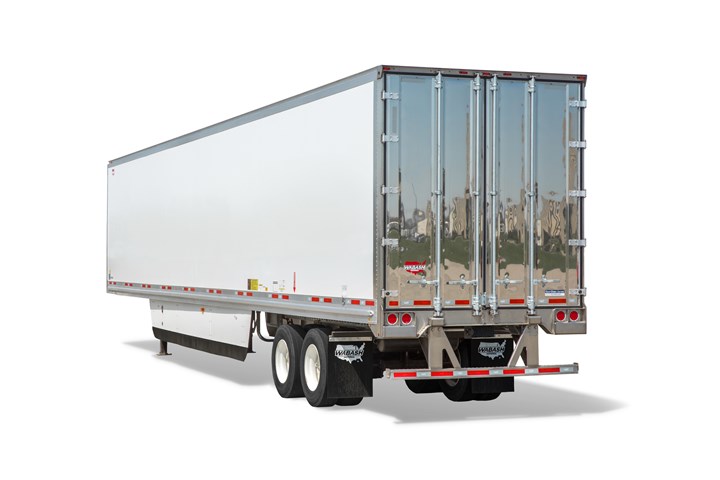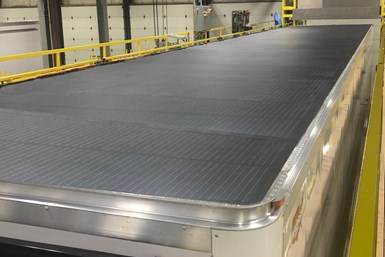Wabash National delivers composite refrigerated trailers
The molded structural composite refrigerated trailer incorporates a more sustainable, zero-emissions solution with lower operation costs.
Share
Read Next

MSC refrigerated trailer. Source | Wabash National
Wabash National Corp. (Lafayette, Ind., U.S.), a company that offers engineered solutions for the transportation, logistics and distribution industries reported on July 23 that it has harnessed eNow (Warwick, RI, U.S.) solar power and Carrier Transicold (Palm Beach Gardens, Fla., U.S.) all-electric refrigeration technologies to offer its customers what it says is the most thermally efficient, eco-friendly refrigerated haul available on the market. The trailer also takes advantage of composite materials.
First shown as a zero-emission trailer at the American Trucking Associations’ (ATA, Virg., U.S.) Technology and Maintenance Council (TMC) meeting in Feb. 2020, the company says the Wabash molded structural composite (MSC) refrigerated trailer with a solar-electric transport refrigeration unit (TRU or Reefer) is now commercially available as a road-ready solution.
Although solar-electric solutions aren’t new to the trucking industry, notes Wabash, the technology hasn’t been widely adopted because no manufacturer has been able to demonstrate a viable, roadworthy solution.
“We haven’t seen high demand for zero-emission trailers for refrigerated hauls due to the location and size of batteries,” explains Robert Lane, Wabash National’s vice president of product innovations. “This is the first time a major trailer innovation has been coupled with a major TRU innovation that results in breakthrough customer value in a sustainable format. Our MSC technology provides a unique platform for electric powered TRUs. The large gain in thermal efficiencies allow a customer to either downsize the batteries required to haul cargo or increase the run time on a battery setup.”
According to the company, the cost to operate and maintain a diesel reefer system can total hundreds of millions of dollars for U.S. fleets. With Wabash National, eNow and Carrier Transicold, Wabash says customers get a zero-emission refrigerated transportation solution that is more energy efficient and has a lower operating cost.

eNow Rayfrigeration solar-electric power system. Source | Wabash National
The Wabash National MSC refrigerated trailer is said to have maximized payload capacity, is corrosion-resistant and maintains the industry’s highest standard floor rating. The incorporated eNow Rayfrigeration system is a solar-electric power system that is said to enable a full 12-hour route duration without employing a diesel engine to power the TRU, cutting operating costs by more than 50% compared to traditional diesel reefers. Additionally, with the Carrier Transicold’s engine-less Vector 8100 unit, Wabash says maintenance and noise are reduced, and emissions and fuel consumption associated with traditional diesel TRUs have been eliminated.
“We are excited about our partnership with Wabash,” says eNow president Jeff Flath. “Our combined technologies should have a major impact in reducing operating cost.”
Customers can learn more about Wabash National’s MSC Reefers with solar-electric TRUs by contacting a Wabash National sales representative at 855-530-3870 or sales@wabashnational.com.
Related Content
-
Bio-based acrylonitrile for carbon fiber manufacture
The quest for a sustainable source of acrylonitrile for carbon fiber manufacture has made the leap from the lab to the market.
-
Composites end markets: Electronics (2024)
Increasingly, prototype and production-ready smart devices featuring thermoplastic composite cases and other components provide lightweight, optimized sustainable alternatives to metal.
-
JEC World 2023 highlights: Recyclable resins, renewable energy solutions, award-winning automotive
CW technical editor Hannah Mason recaps some of the technology on display at JEC World, including natural, bio-based or recyclable materials solutions, innovative automotive and renewable energy components and more.















